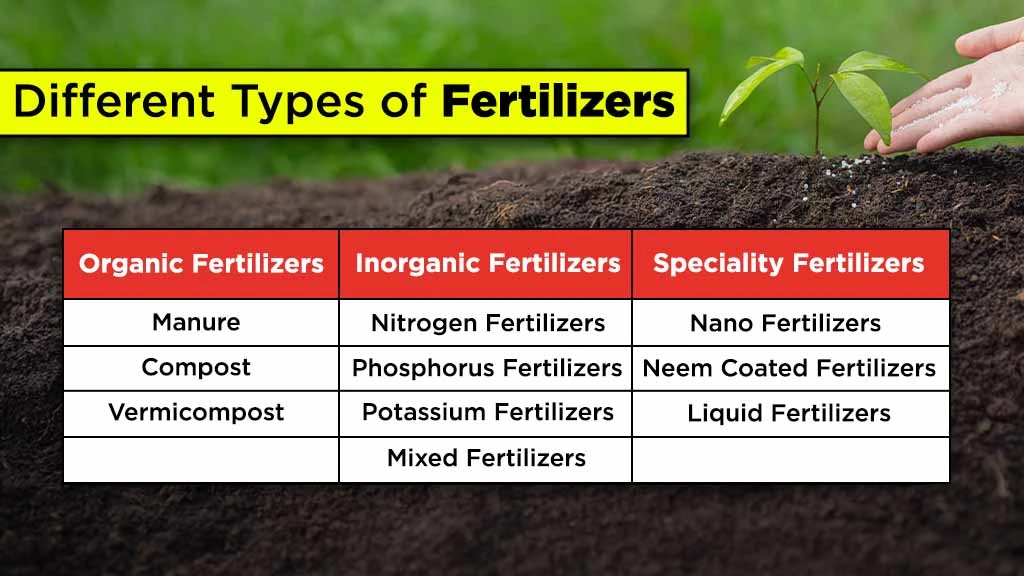Types of Fertilizers Used in Agriculture in India

Agriculture is the backbone of India’s economy and to meet the growing demand for sustainable agricultural productivity, fertilizers have played a crucial role. Fertilizers are added to the soil to increase its fertility and improve crop yield. There are different types of fertilizers used based on the crops. The major types of fertilizers are organic and inorganic. In this blog, we will understand the role of fertilizers along with their types, the fertilizer market and future prospects.
Table of Contents
- What is the Role of Fertilizers in Improving Crop Production?
- What are the Different Types of Fertilizers?
What is the Role of Fertilizers in Improving Crop Production?
Fertilizer is a natural or synthetic substance added to the soil to supply one or more plant nutrients. Fertilizers are important for the plant growth and crop yield. They help to fulfil the food demand which is increasing day by day due to rapid population growth. Sometimes, the soil does not have enough macro and micronutrients to grow good-quality crops. Fertilizers act as an alternative nutrition source, so plants get suitable nourishment and grow well. They also ensure a higher yield that allows farmers to earn more. The majority of fertilizers have three nutrients essential in their composition for healthy crop growth: Nitrogen (N), Phosphorus (P) and Potassium (K).
Also, agriculture faces several challenges, like pests, diseases, and soil fertility loss. This is why using fertilizers in agriculture is necessary to produce more crops while making them resilient towards these challenges. Some examples of fertilizers are manure, compost, NPK fertilizers and Liquid fertilizer.
What are the Different Types of Fertilizers?
Organic and inorganic are the two major types of fertilizers used in agriculture. Let’s understand these fertilizers in more detail below:

Organic Fertilizers
Living organisms like plants and animals produce organic fertilizers. Micro-organisms in the soil decompose the organic matter and provide nutrients to the soil. These fertilizers contain essential nutrients that promote soil fertility.
Organic fertilizers improve the texture of soil due to which its water-retention capacity increases. They are also rich in organic matter that allow micro-organisms to thrive. Also, the release of nutrients like nitrogen is slower, preventing the risk of root burning.
As they do not have harmful chemicals, they do not have a negative environmental impact. Thus, they promote ecological balance and sustainable agriculture in India. This is why organic fertilizers are an important component of organic farming.
Farmyard Manure
The decay of plant and animal waste prepares manure. Examples of manure sources include cattle shed waste (urine and dung), slaughterhouse waste (meat meal and bone meal), poultry waste and crop waste (stubbles and sugarcane trash).
Farmyard manure is a rich source of macronutrients and increases soil fertility. This fertilizer is cost-effective as farmers can easily produce it using natural and local sources like cow dung, goat droppings, crop waste, and organic waste from households.
Compost
Compost is prepared by decomposing a variety of organic materials, like farm waste, food waste, and crop residues. Generally, it uses food and plant waste, but it can also contain livestock waste. Composting involves the rotting of organic materials in a compost pit, which is usually kept covered.
Micro-organisms in the soil use oxygen to break down the organic matter and form a nutrient-rich product called compost. This compost provides key nutrients to the soil and improves its fertility. It also promotes the growth of valuable micro-organisms in the soil. This compost is widely used in urban agriculture, gardens and horticulture in India.
Vermicompost
Earthworms prepare vermicompost within 45 days by consuming organic matter like plant residues and biological waste material. Their excretion is called earthworm casts and is rich in nutrients and humus. Examples of biodegradable wastes for preparing vermicompost are vegetable waste, hotel refuse, weed biomass, crop residues and agroindustry waste.
Nutrient-rich castings make the soil rich in micro-organisms and nutrients as they contain higher amounts of nitrogen, phosphorus and potassium. Vermicompost improves the aeration, structure and water-holding capacity of the soil. It uses organic waste efficiently to reduce soil-borne diseases and weed growth.
Inorganic Fertilizers
Inorganic fertilizers are prepared using chemical processes to provide specific nutrients in desired quantities. The main benefit of these fertilizers is that they are more soluble than organic fertilizers and thus release nutrients quickly in the soil. Inorganic fertilizers provide macronutrients in large amounts, mainly NPK, along with secondary and micronutrients. The key types of inorganic fertilizers are:
Nitrogen Fertilizers
Nitrogen fertilizers help providing nitrogen to the plant. Nitrogen deficiency is a common issue in soil. Thus, most fertilizers in India are nitrogen fertilizers. There are several ways in which these fertilizers impact crop growth. Nitrogen fertilizer promotes the growth of foliage and makes the plant more tender and succulent. Common examples of nitrogen fertilizers are calcium ammonium nitrate, ammonium sulphate and Urea.
Phosphorus Fertilizers
As the name suggests, this type of fertilizer is rich in phosphorus. It is prepared with the help of rock phosphate. Plants have phosphorus in the cell protoplasm, which is vital for cell growth. The roots of plants, fruits and flowers grow well because of phosphorus fertilizer.
Phosphorus fertilizers improve nutrient uptake and ensure quality produce and higher yields. Some of the main phosphorus fertilizers that are available commercially include dicalcium phosphate, triple super phosphate and single superphosphate.
Potassium Fertilizers
Potassium is among the essential macronutrients that are used for flowering of the plants, so these fertilizers ensure ideal plant growth. There is an improvement in crop productivity through good potassium nutrition. Potassium deficiency can hamper crop growth and result in lower yields.
Also, potassium improves access to water from deeper soil layers by increasing the length and density of roots. This makes crops drought tolerant. Some of the common potassium fertilizers are potassium sulphate and Muriate of potash.
Mixed Fertilizers
A mixed fertilizer has more than a single macronutrient for crops. It is prepared by mixing the ingredients carefully through a manual or mechanical process. This fertilizer promotes plant growth by making major macronutrients (NPK) available to crops through the same material. It is widely used in Indian agriculture.
Another benefit is that the proportion of nutrients can be changed based on the soil and crop profile. It helps to achieve balanced manuring and increase yield and profit for farmers. Examples of popular mixed fertilizers are ammonium phosphate sulphate and nitro-phosphate and di-ammonium phosphate or DAP fertilizers.
Speciality Fertilizers
Speciality fertilizers are used to provide targeted formulations and nutrients to fulfil the particular demands of crops. Due to this targeted approach, they can significantly improve crop yields. Speciality fertilizers can impact specific metabolic functions and growth stages in plants. There is an improvement in nutrient delivery because of the specialized aspect of these fertilizers. Speciality fertilizers names include:
Nano Fertilizers
The new generation fertilizers or Nano fertilizers use advanced nanotechnology to release the nutrients in the soil in controlled manner for an extended period to achieve efficiency in application and cost. These fertilizers have nano sized particles of less than 100 nanometers that are easily absorbed by crops resulting in improvement in crop yield. Some of the nano materials used in the production of nano fertilizers are carbon nanotubes, quantum dots and graphene.
Neem Coated Fertilizers
This fertilizer uses a coating of neem on Urea so that the release of nitrogen can be slowed down. Thus, there is less loss of nitrogen due to leaching. In addition, it protects the crops against insects and pests. Nitrogen is provided to plants efficiently. It results in healthy and higher crop yields.
Liquid Fertilizers
Liquid fertilizers are directly applied using foliar spray or with the help of irrigation water. Farmers prefer this fertilizer as it offers convenient application and the opportunity to mix it with herbicides. It allows the roots and leaves of plants to absorb nutrients quickly. If there is a nutrient imbalance, liquid fertilizers can promptly fix it.
What is the Status of the Fertilizer Market in India?
According to the Ministry of Chemicals and Fertilizers, the fertilizer market has seen a rapid growth. In 2013-14, the urea production was marked as 227.15 LMT, which has been increased in 2024-25 with 306.67 LMT, marking an impressive growth of 35%.
Similarly, the production of DAP and NPKS fertilizers combined has grown from 110.09 LMT to 158.78 LMT in 2024-25 with an increase rate of 44%, reflecting the Government’s consistent efforts to enhance Atmanirbharta in the fertilizer sector.
As of August 2026, Urea sales have increased by over 13 LMT compared to the same period last year.
What are the Future Prospects of Fertilizers?
The use of synthetic fertilizers has severe environmental impacts like groundwater contamination, greenhouse gas emissions, eutrophication and soil degradation. But there is no possibility of completely ending the use of fertilizers. So, the best way to reduce its impact is the use of organic fertilizers. Organic farming is a highly sustainable farming method that only uses organic manure to improve soil fertility. Other helpful practices to make the soil more fertile include growing cover crops, crop rotation, intercropping and mulching.
The government of India also supports the use of organic fertilizers through different schemes and subsidies. It is obvious that more food production is needed, and agriculture fertilizers play a big role in it. However, care needs to be taken so that there is no indiscriminate use of chemical fertilizers.
Frequently Asked Questions On Types of Fertilizers Used in Agriculture in India
1. What are fertilizers?
Fertilizers are natural or synthetic substances that are added to the soil to increase soil fertility and promote healthy crop growth.
2. What are the top three fertilizers?
The top three fertilizers are Nitrogen, Phosphorus and Potassium.
3. What are the three uses of fertilizers?
The uses of fertilizers include increased soil fertility, meeting the nutritional needs of crops and increased crop output.
4. Why are manure and fertilizers used in fields?
Manure and fertilizers are used in fields to ensure soil receives essential nutrients for healthy crop growth.
5. What is DAP fertilizer?
DAP, or di-ammonium phosphate, is a mixed fertilizer that is widely used in India.


Related Blogs












